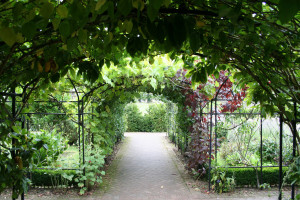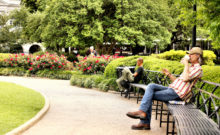Trellises, arbors, and pergolas are all garden structures that are designed to allow plants to climb vertically. They provide an interesting visual feature for your garden, softening and changing the look. While these terms are sometimes used interchangeably, there is a difference between a trellis, an arbor, and a pergola. Here’s what you need to know:
Trellis
Trellises are simple structures designed to allow climbing plants to grow vertically. They are typically rectangular in shape and vertical in orientation, made from a variety of materials including copper, wood, nylon netting and wire. They are sometimes sloped to keep plants up and off the ground. Here is a simple trellis we setup for many of our customers.
Arbor
Arbors are a larger and more ornate versions of a trellis, with either an arched or flat roof slats. They are characterized by a simple form, and often serve as a focal point of a path or garden. They can also be used to soften the look of a large garden area. Arbors are most commonly made from wood, including lumber, natural cedar posts and even driftwood.
Image by Pradeep Sanders, used under its Creative Commons license.
Pergola
Pergolas are usually larger in size and scale than arbors, and have historically served as an extension to a building. As more of a permanent architectural structure, they feature heavy beam construction, horizontal roof structure, and larger monolithic designs. They are great for creating a bridge between the home and garden. In addition to creating a space for climbing plants, pergolas usually provide enough space underneath for a sitting area, allowing a breeze and light sun to pass through.
Image by John Lambert Pearson, used under its Creative Commons license.
Cover Image by Pamla J. Eisenberg, used under its Creative Commons license.
[Got a Tip?] If you have a tip to share with your fellow urban farmers, let us know at tips@youngurbanfarmers.com. Want More Tips? Browse our Tips Archive for more.








